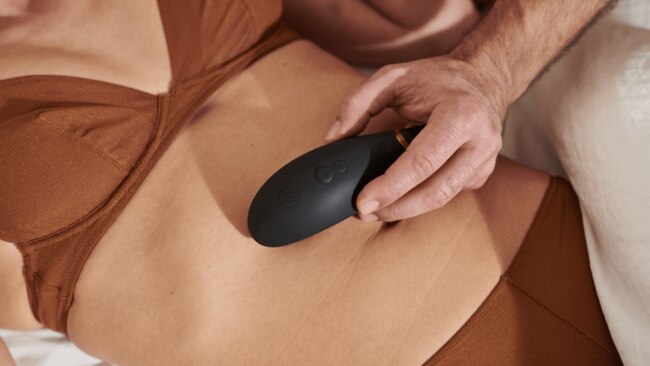Libido higher than his? Here's how to manage mismatched sex drives
Yes you can be supportive and satisfied
Lifestyle
Don't miss out on the headlines from Lifestyle. Followed categories will be added to My News.
For years we've been led to believe that men have higher libidos than women, but for many Australian couples, this couldn't be further from the truth.
After centuries of misinformation, experts are calling time on one major male myth - and it’s a gender stereotype we’ve all been guilty of perpetuating.
That men have higher libidos than women.
“It’s the social construct and discourse that’s being told about who we are supposed to be sexually, whether we are a man or a woman, and I think it’s important to understand that but then also to dispel it,” Lauren Muratore, an accredited clinical psychosexual therapist at Integrated Sex and Relationship Therapy in Melbourne, tells Body+Soul.
Like what you see? Sign up to our bodyandsoul.com.au newsletter for more stories like this.
Because beyond society’s expectations for how different genders should behave, women are undergoing their own sexual awakenings.
Whether it’s the result of life changes or hormonal shifts, Muratore says “there’s often no rhyme, rule or reason” for some women suddenly wanting more under the sheets.
“The important thing to point out,” she explains, “is that our sex drives are not linear.”
The sexual awakening
Victoria, 38, has been married to her husband for 12 years. For the first half of their marriage, they both had low libidos and their sex life was “pretty average”.
Victoria was also faking orgasms. But then about six years ago she began to explore her sexuality and discovered self-pleasure.
“Until then I’d never had an orgasm nor had I ever masturbated,” she tells Body+Soul. “I was raised in a very Catholic family and never had the curiosity to explore. Sex was taboo and I never truly enjoyed it or desired it.”
Since then, Victoria’s been looking to make up for lost time.
“I definitely crave orgasms!” she says. “It’s like I’ve wasted 30-something years of my life not knowing I could feel this good. But hey, it’s never too late!
She explains it as an “awakening in life in general”.

“Maybe it’s maturity and my age, but I’m willing to advocate for my needs and what I want and what makes me happy,” she explains, “and in that comes my sexuality.”
However, while she’s now “more in tune” with her body than ever before and keen to keep exploring, her husband isn’t as eager.
“I'd happily have sex every day,” she says. “But he is happy with less. I feel like he is keen 80 per cent of the time when I initiate it, but if I didn’t initiate it we would have less sex.”
The motherhood resurgence
For 42-year-old Kayla, her sex drive has never been so high. And it’s got a lot to do with her kids growing up.
“When they were younger, I was mostly a stay-at-home mum as my husband worked long hours,” the mother-of-two explains. “I wasn’t getting much sleep and had little time alone for exercise or activities I’d consider self-care.”
Now her children are 13 and 11 and she’s got more time for fitness, which has left her feeling more confident in her body and more energised.
But it means her sex drive is now “much higher” than her husband’s.
“We’ve been married for 16 years and have sex about once or twice a month and it’s been that way for about 10 years now,” she says. “I cope by masturbating about four to five times a week.”
Bella Krutik, a feminine embodiment coach, isn’t surprised at Kayla’s resurgence, saying she works with a lot of mums who find themselves craving sex more than they did in the early years of motherhood.
“They’ve got more time to themselves and are rediscovering pleasure,” she tells Body+Soul. “They think about sex more and they want sex more.”

But often it comes with self-perceived shame and guilt.
“A lot of women subconsciously pigeonhole themselves into the role of mother and what they believe that should look like, and so anytime they want something for themselves, particularly sex, they feel like there's something wrong with that because it means they're putting themselves and their needs first,” Krutik explains.
“A lot of these mums think, ‘Oh I am just going to leave it because I don’t want anyone to judge me and I don’t want my partner to tell me that I'm being selfish because I should just be focusing on the kids and not me’,” the Sydney-based coach says.
The important thing to remember, Krutik adds, is that it’s absolutely natural for your sex drive to increase as you get older, and giving yourself more ‘you time’ can benefit everyone.
“If you allow pleasure into your life and give yourself permission to enjoy those things you’ve been putting away on the shelf for so many years,” she explains, “the more capacity you’ll have to be an even better mother and partner because you're meeting those needs.”
So, how do you navigate mismatched libidos?
Just like everything when it comes to sex, communication is key.
“Understanding each other and where two people sit is so important, rather than creating any narrative that there is anything wrong with anybody or feeding into the rejection cycle,” Muratore says.
She suggests talking to your partner about how you’d both like to initiate sex, and taking off the pressure that intimacy has to be “all or nothing” when there are plenty of other activities.

Krutik also adds that people need to be able to clearly express what their needs are.
“A really important part is being able to identify what you actually want,” she explains. “I don't necessarily mean, ‘I want this position in the bedroom and I want to have sex five times a week’, but actually being able to say what brings you pleasure.
“Be specific.”
Foreplay starts after your last sexual encounter
When it comes to more practical ways to get your lover in the mood, Muratore suggests putting in some ‘couples time’ rather than scheduling sex which can put unhelpful pressure on a partner.
“Think about how you want to spend your intimate time,” she explains. “Maybe that’s making out, getting naked, giving each other erotic massages or using toys on each other.”
While couples should consider every interaction as a warm-up.
“The context of the anticipation is important to understand,” she says. “Foreplay starts after your last sexual encounter so it's actually every micro moment that you have with your partner that builds up the anticipation.
“Whether that's complimenting them, cuddling or kissing more passionately without it having to lead anywhere,” the psychsexual therapist says.
“It’s about creating more passion that doesn’t have any expectations.”
More Coverage
Originally published as Libido higher than his? Here's how to manage mismatched sex drives




